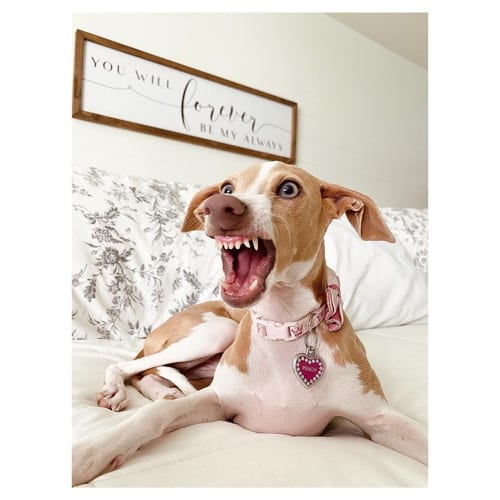As dog lovers, you always keep thinking about how you can take good care of your dogs – routine checkups, quality food, and even different types of fitness.
But what about dog dental care? Have you also considered taking care of their teeth?
Oral hygiene usually being overlooked by many dog owners.
They sometimes forgot to take extra care of their teeth, which is said to be one of the essential factors in your pet’s overall health condition.
Just in case he experiences sore gums or toothache, then’ he might be dealing with stress and pain, which you may not know about.
If these were left untreated, bacteria might be produced due to the said problem.
These may enter their bloodstream and may eventually affect his kidney, liver, or heart.
The veterinarians reported that approximately 85% of dogs over four years old suffer from some sort of periodontal disease.

This kind of disease is a throbbing oral condition that may lead to infection and tooth loss.
However, if you always take good care of your dog’s teeth and have overall dental care, then these problems may be prevented.
You can avoid any tooth disease for your dogs by professional checkups and dental cleanings.
Just like regular grooming for dogs, dental care must be observed regularly as well.
So, it would be an ideal decision to introduce dental care procedures when your doggie is still young or puppy.
However, don’t be stressed if you have just realized that your adult dogs’ teeth require some attention.
Always remember to take it slowly and patiently approach your dogs with extra love and care. Surely, you will win him over in taking good care of their teeth.
The majority of the experts confirm the brushing regularly is a good idea, but it may be sometimes unrealistic.
If it’s quite impossible to do, you can aim to brush your dog’s teeth at least 3-4 times a week.
Aside from that, don’t rush on brushing your dog’s teeth.
If your pet’s patience only lasts for only half of his teeth today for the brushing routine, then you can just brush the other half of their set of teeth for the next day.
Just always wear the best patience that you have in taking care of your dog’s oral hygiene.
What are the Best Ways in Taking Good Care of Your Dog’s Teeth?

If you want to make sure that you are doing the right thing for your dog’s oral care, it would be better to explore the best ways and tricks on how you can manage cleaning or taking care of their teeth.
For you not to worry about the right things to do relative to dental care for your dogs, then the following dog dental care tips are listed for you:
1. Brush your dog’s teeth
Brushing the teeth of your dog may sound silly; however, it is the best way to avoid plaque buildup.
It doesn’t necessarily mean that you need to brush the teeth of your dogs every day.
But of course, the more often you can brush their teeth, the better it would be for your dogs.
You may notice that your dogs are not that too comfortable brushing their teeth.
So, all you need to do is train your pets to brush their teeth just like the way you do on trimming their nails.
If you plan to brush your dog’s teeth, then you may take several options to do that.
The first thing that you may do is get a toothpaste which is made exclusively for dogs.
Don’t use toothpaste for humans because it contains ingredients that are toxic to them.
If you use dog toothpaste, they might want to have it since it comes in different flavors, such as peanut butter or delicious chicken.
The second option you can do is to utilize a toothbrush for your dogs or just a brush that would fit your fingertip.
You may consult your veterinarian about the best type of toothbrush, which you will use for them to provide great comfort.
2. Dogtooth wipes
If you can’t brush your teeth or you want to change your cleaning techniques, then using a dog dental wipe is a nice option.
There are some sorts of tooth wipes for dogs that are designed for rubbing against the teeth of your pet. By doing this, you can help them to remove their tooth plaque.
Tooth wipes are just like toothbrushes; however, these cannot get into tiny crannies and nooks, which a brush can do.
But still, these tooth wipes for dogs are one of the nicest ways to clean the teeth of your pet.
Using these things would be easier compared to using a toothbrush with dog toothpaste.

3. Dog chews
There are numerous types of dog chews that are available in the market. Almost all these dog chews have properties for teeth-cleaning.
The manner of chewing can also benefit the overall health of your dog.
The gnawing pickle plaque off your dogs’ teeth and most of these are naturally made from meat that contains enzymes.
Then, these help in promoting the dental health of your dog.
Chews like bully sticks, chicken strips, and cow ears are great ways to keep your pets healthy and happy.
Just in case you are looking for some types of chews without calories, then you might consider choosing long-lasting nylon or rubberized dog chew toys.
These toys may also do the job of cleaning their teeth.
4. Dog dental treats
Since dogs usually love treats, then you can make use of some sorts of dental treats for your pets to improve their dental health.
There are different types of dog treats that can help in removing plaque buildup.
Most of these products contain ingredients that clean the dog’s mouth and freshen a dog’s breath.
These dental treats are often appreciated by dogs rather than using a toothbrush with toothpaste and some dental tooth wipes.
These treats perform a great job in making sure that the teeth of your dogs are clean.
Dental treats have various sizes, flavors, and shapes, and you can find the best treats that are suitable for your dogs.
5. Professional cleanings
One of the best ways to make sure that your dog will receive proper healthcare is by undergoing professional cleanings by the veterinarian.
Of course, your vet knows best about your dog’s teeth, and they can easily address the issues that he may find.
Although a professional cleaning from a veterinarian provides an expensive cost from your pocket, you can have a guarantee that your dog’s oral hygiene will be properly maintained.
Your dog’s veterinarian is a well-experienced doctor who can help you prevent and treat any possible issues that you may not easily notice.
So, it is advisable to consider visiting the veterinarian in your locality for a dog’s professional exam.
This could be the best option that you can pick if you want to enhance your pets’ overall dental health.
With these simple tips and strategies that were mentioned above, you can now successfully promote proper dental health care for your dogs.
Choose among those tips which will be suitable for your dogs.
How Many Teeth Do Dogs Have?

As part of your dog’s dental care regimen, have you ever considered asking yourself if how many teeth do dogs have?
Generally, puppies have temporary teeth, which sooner or later fall out to give way for teeth during adult.
Puppies have 28 teeth, and these are commonly known as milk teeth.
According to Dr. Rachel Barrack, an owner of Animal Acupuncture in NYC, milk teeth start to appear two weeks after the dog’s birth and completely grown for about 8-10 weeks after.
It is quite hard to miss the razor-like teeth of a puppy, especially when the doggie is grasping at you.
You’re probably asking yourself why a pup’s teeth are like needles that are very sharp when nipping.
Dr. Barrack pointed out that the puppies’ teeth need more help in chewing food at this stage since their jaws are not sturdy enough compared to those of adult ones.
So, the puppies’ sharp teeth help them chew when they start to eat more food and even gnaw toys, treats, and bones.
Dogs usually lose their teeth quickly because of rapid maturation.
Depending on the dogs’ breed and size, the incisors are first to be broken out around four months old, followed by those canine teeth that usually fall out around 5-6 months old.
Then, the molars and premolars will come in the middle of 5 and 8 months.
Then, there would be 42 total permanent teeth on dogs—those teeth by the puppy which don’t break out are required to be extracted by your veterinarian.
Know the Different Dog Dental Care Concerns
If you had noticed some changes in the mouth of your dogs, like discoloration, lumps, sores, change in smell, or swelling, then you need to consult your veterinarian immediately.
These issues may be a sign that your pet is experiencing an oral condition or disease that requires oral treatment.
Below are some of the common issues and problems related to dog oral care.
- Halitosis: This is commonly known as bad breath. This could be a sign of a problem with your dog’s dental health. This problem appears when bacteria from the food get stuck in your pet’s mouth. Without further treatment, this may result in an infection. A bad breath can normally be treated by just regular brushing. However, if it is caused by some serious problems such as kidney disease or infection, then it is advisable to consult your vet at once.
- Tumors and cysts: If you have noticed that there are lumps on your pet’s mouth, they have an appointment with your veterinarian for a checkup. These lumps may represent a tumor or a cyst. There’s a need to remove the cysts by your veterinarian, and the lumps must be biopsied and extracted if they are found to be malignant.
- Gingivitis: This dental problem may be a cause of inflamed gums due to heavy plaque on your dogs’ teeth. By cleaning your dog’s teeth regularly, this dental problem is reversible.
- Periodontal disease: It is a type of infection between gums and teeth that can cause pain, loose teeth, swelling, nasal discharge, and difficulty eating. The experts strongly advise dog owners to monitor such signs as brown or yellow teeth, difficulty chewing, and swollen or red gums. Just in case your dog has any of these signs of mouth pain or loss of teeth, then it is recommended to take your pet to your veterinarian. Your dog needs to be examined to find possible signs of infections. If infections were found, then immediate treatment should be necessary.
It is always important to know these different types of dental problems or conditions in your dog.
With enough knowledge and understanding about these concerns, then you can provide the best dental care for your dogs.
